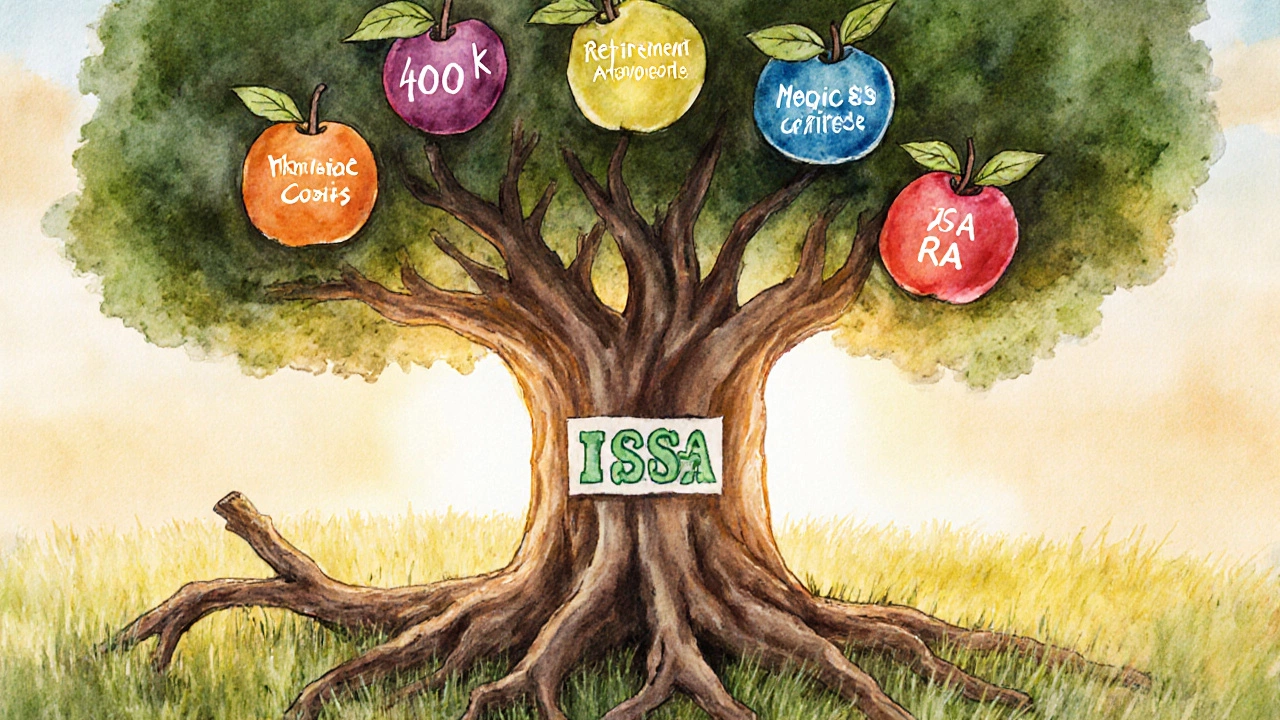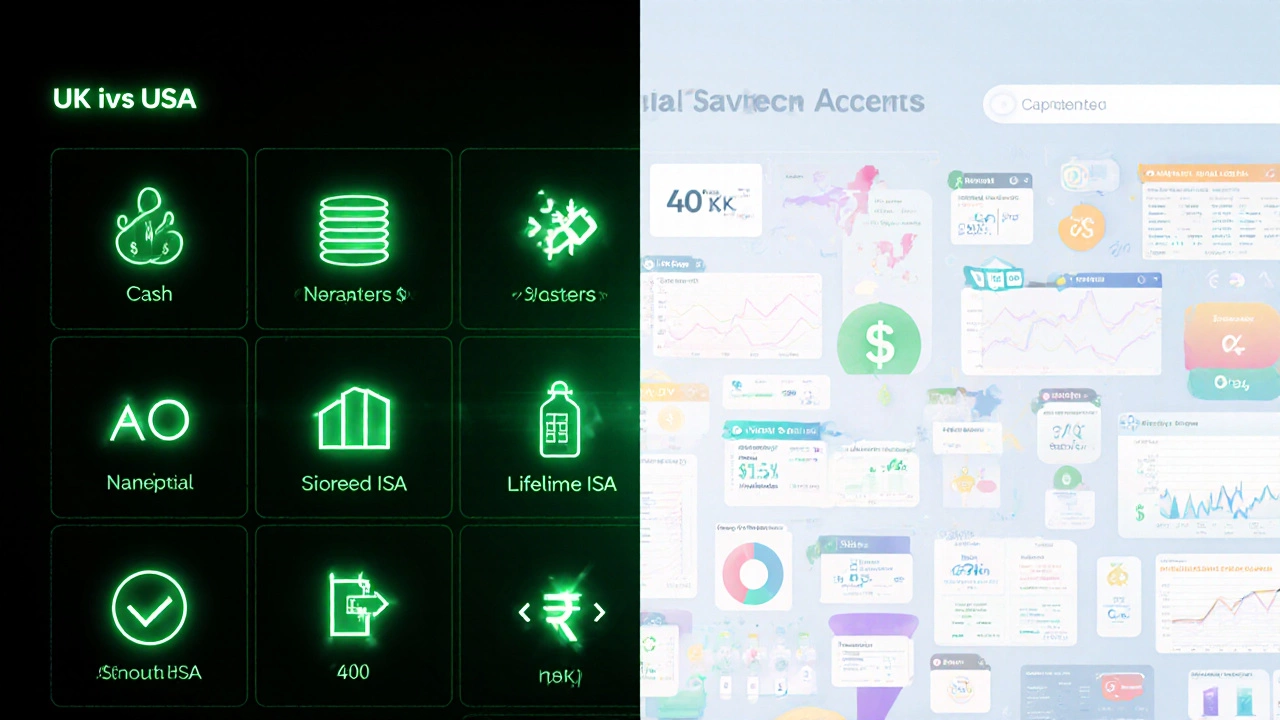Tax-Free Savings Calculator
Calculate Your Tax Savings
Compare tax benefits of US retirement accounts against taxable investing. Based on 2025 contribution limits.
Your Tax Benefits
Based on your inputs, here's how much you could save:
| Account Type | Contribution Limit | Tax Savings | Best For |
|---|---|---|---|
| 401(k) / IRA | $23,000 | Retirement savings | |
| HSA | $4,800 | Medical expenses | |
| Total Tax-Free Space |
If you’re from the UK and you’ve moved to the US-or you’re just curious about American finance-you’ve probably asked: Does the US have ISA accounts? The short answer is no. The US doesn’t have ISA accounts. Not even close. But that doesn’t mean Americans don’t have ways to save and invest tax-free. They just use completely different tools.
What Is an ISA, Anyway?
ISA stands for Individual Savings Account. It’s a UK-specific product that lets you save or invest money without paying tax on interest, dividends, or capital gains. There are different types: Cash ISA, Stocks and Shares ISA, Innovative Finance ISA, Lifetime ISA, and Help to Buy ISA. Each has its own rules, but the big draw is the tax shield. For 2025, the annual allowance is £20,000. That means you can put that much in, and the government won’t touch any of the growth.
It’s simple, flexible, and popular. Over 20 million UK adults hold ISAs. But if you’re in the US, you won’t find an ISA on any bank’s website. Not at Chase, not at Wells Fargo, not even at your local credit union. The US tax system doesn’t offer this exact structure.
Why Doesn’t the US Have ISAs?
The US tax code is built differently. Instead of one universal tax-free wrapper like the ISA, the US offers a patchwork of specialized accounts, each with its own rules, limits, and eligibility. The government prefers targeting specific goals-retirement, education, health-rather than giving people a broad, flexible savings bucket.
Also, the US has a much more complex tax system overall. The IRS tracks income, deductions, and credits across dozens of forms. Adding a new, broad-based tax-free savings vehicle would require massive changes to how income is reported and taxed. Politically, it’s a hard sell. Most tax reform in the US focuses on lowering rates or expanding existing accounts, not creating new ones.
What Do Americans Use Instead of ISAs?
While there’s no direct US equivalent, Americans have several accounts that cover parts of what an ISA does. Here’s how they compare:
- 401(k) and IRA - These are the closest in terms of tax benefits. Traditional 401(k)s and IRAs let you contribute pre-tax income, and your investments grow tax-deferred. Roth 401(k)s and Roth IRAs are funded with after-tax dollars, but withdrawals in retirement are completely tax-free. For 2025, you can contribute up to $23,000 to a 401(k) if you’re under 50, and $7,000 to an IRA. Roth IRAs have income limits, though-single filers earning over $153,000 can’t contribute directly.
- HSA - Health Savings Accounts are triple-tax-advantaged: contributions are tax-deductible, growth is tax-free, and withdrawals for qualified medical expenses are tax-free. You must be enrolled in a high-deductible health plan to open one. For 2025, the contribution limit is $4,800 for individuals and $9,150 for families. Many Americans use HSAs as long-term savings tools, even beyond medical costs.
- 529 Plans - These are for education savings. Contributions aren’t federally tax-deductible, but earnings grow tax-free, and withdrawals for qualified education expenses are tax-free. Some states offer state income tax deductions. These aren’t for general savings, but they’re powerful for parents saving for college.
- Taxable Brokerage Accounts - These are the default for most non-retirement investing. You pay capital gains tax when you sell investments at a profit, and dividends are taxed annually. But you have full control over when and how much you withdraw. No contribution limits. No income restrictions. Just taxes on gains.
So while a UK resident might use a Stocks and Shares ISA to hold ETFs, stocks, and bonds with zero tax on gains, an American might use a Roth IRA for the same purpose-or a taxable brokerage if they’ve maxed out their retirement accounts.

Can Americans Open an ISA If They Live in the US?
No. ISAs are only available to UK residents for tax purposes. Even if you’re a US citizen living in the UK, you can open an ISA-but you still have to report it to the IRS. The US taxes its citizens on worldwide income, regardless of where they live. So while you might avoid UK tax on your ISA, you’ll still owe US tax on any gains or interest, unless you qualify for the Foreign Earned Income Exclusion or Foreign Tax Credit.
And if you’re a US citizen living in the US? You can’t open an ISA at all. UK banks and brokers won’t let you. The system is designed for UK tax residents only.
What If You Move from the UK to the US?
If you’ve been living in the UK and you’ve built up ISA savings, you can take your money with you. But here’s the catch: once you become a US tax resident, your ISA is no longer tax-free under US law. The IRS treats it like a regular brokerage account. Any growth after you move is taxable. You’ll need to report it on your US tax return.
Many expats panic about this. But there’s a workaround: you can leave your ISA open and let it sit. Don’t make new contributions. Don’t trade. Just hold it. The original contributions (the money you put in while a UK resident) aren’t taxed again. Only the growth after you become a US resident is subject to US tax. If you don’t touch it, the tax bill stays low.
Some people choose to cash out their ISA before moving. But that’s not always smart. If you’ve had it for years and it’s grown a lot, selling early could mean paying capital gains tax in the UK before you even leave. It’s better to consult a cross-border tax advisor before making any moves.

Should Americans Wish for an ISA?
Some people argue the US should adopt an ISA-style account. It’s simpler. It encourages saving. It gives people flexibility. But others point out the downsides: ISAs don’t target specific needs like retirement or health. They can become just another savings account people forget about.
The US system, for all its complexity, does push people toward long-term goals. A Roth IRA isn’t just a savings tool-it’s a retirement tool. An HSA isn’t just a bank account-it’s tied to your health plan. The structure forces discipline.
Still, the lack of a flexible, all-in-one tax-free savings vehicle leaves many Americans scrambling. A 30-year-old might max out their Roth IRA, save in a taxable brokerage, and still feel like they’re missing out. They’re not wrong. The US system is fragmented. It works well if you’re organized. It’s a nightmare if you’re not.
Bottom Line: No ISA in the US, But You Can Still Save Tax-Free
Does the US have ISA accounts? No. But it doesn’t need them. Americans have a set of powerful alternatives that, when used together, can do everything an ISA can-and more. The key is understanding how each account works and how they fit into your overall plan.
If you’re new to US finance, start here:
- Contribute to your 401(k) up to the employer match-that’s free money.
- Open a Roth IRA if you qualify. It’s the closest thing to a Stocks and Shares ISA.
- If you have a high-deductible health plan, max out your HSA. It’s the most powerful tax-advantaged account most people ignore.
- Use a taxable brokerage for anything beyond those limits.
You won’t get one account that does it all. But you can build a system that does. And that’s better than a single, simple box.
Can I open an ISA in the US if I’m a UK citizen?
No. ISAs are only available to UK tax residents. Even if you’re a UK citizen living in the US, you can’t open a new ISA. If you already have one from when you lived in the UK, you can keep it open, but the IRS will treat any growth after you become a US resident as taxable income.
Are Roth IRAs the same as ISAs?
Roth IRAs are the closest US equivalent, but they’re not the same. Both allow tax-free growth and tax-free withdrawals. But Roth IRAs are mainly for retirement-you can’t use them for a house deposit or emergency cash without penalties. ISAs are flexible-you can withdraw anytime, for anything. Roth IRAs also have income limits and annual contribution caps, while ISAs have a flat annual allowance.
Can I transfer my UK ISA to a US account?
You can cash out your ISA and move the money to a US bank or brokerage, but you’ll lose the UK tax benefits. Once the money is in the US, it’s subject to US tax rules. If you sell investments inside the ISA after becoming a US resident, you’ll owe capital gains tax to the IRS. There’s no official transfer process between UK and US accounts.
Do US citizens pay tax on ISA interest earned in the UK?
Yes. The US taxes its citizens on worldwide income. Even if your ISA is tax-free in the UK, you must report any interest, dividends, or capital gains to the IRS. You may be able to claim a foreign tax credit if you paid UK tax, but since ISAs are tax-free, that credit doesn’t apply. The growth is fully taxable in the US.
What’s the best way for a US resident to save tax-free like an ISA?
Use a combination of accounts: max out your Roth IRA and HSA first. Then invest in a taxable brokerage. The Roth IRA gives you tax-free growth for retirement. The HSA gives you tax-free growth for medical costs-and can double as a long-term savings tool. Together, they cover most of what an ISA does. You won’t have one account, but you’ll have more flexibility and higher limits overall.
Next Steps
If you’re trying to replicate ISA benefits in the US, start with your Roth IRA. If you’re under 50, you can put in $7,000 this year. If you’re eligible for an HSA, add another $4,800. That’s $11,800 in tax-free growth space-close to half of the UK ISA limit. Then, invest the rest in a brokerage account and track your gains carefully.
Don’t wait for the US to copy the UK. Build your own system. It’s not perfect. But it works.
